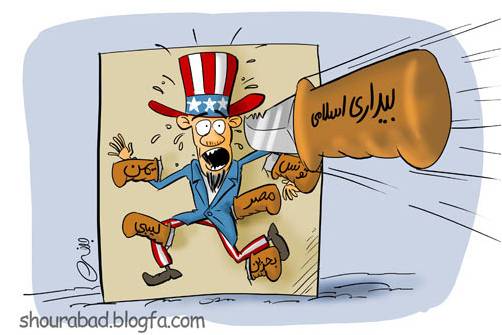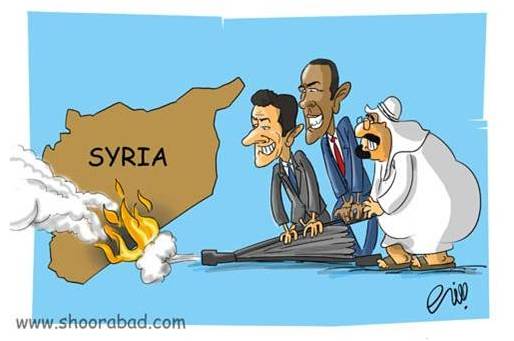IRAN'S SPIN ON THE ARAB SPRING

Number 46 ● 13 November 2011
IRAN'S SPIN ON THE ARAB SPRING
Elisheva Machlis*
Ten months after the outbreak of disturbances in Tunisia which triggered the Arab Spring, Iran is seeking to gain influence with the new regimes which are emerging in its aftermath. On September 17, 2011, Tehran hosted a two-day conference entitled "The First International Conference on Islamic Awakening" (bidari-ye eslami), attended by representatives from approximately 80 countries in the presence of top Iranian officials, according to its organizers (see the poster bellow).
This was not the first time that the Islamic Republic sought to create a global Islamic agenda. During the presidency of Mahmoud Ahmadinejad, the Islamic regime has reemphasized Iran’s ideological Islamic character and reversed the more pragmatic policy of his predecessors Mohammad Khatami and Akbar Hashemi Rafsanjani. Ahmadinejad has combined Islamic zealotry at home with strong anti-Western rhetoric and a pan-Islamic agenda, with the aim of asserting Iran’s leadership in the Muslim world and beyond.
The Islamic Awakening conference was a culmination of Iran's effort to lay claim to the Arab Spring and shape it in its own image. Iran has cultivated long-lasting ties with the radical Palestinian organizations, the Hamas and the Islamic Jihad and since 2005 enjoys support from the Arab street for standing up to the West. Yet, the Iranian president failed to rally Arab public opinion behind his messianic Shi'ite worldview. Furthermore, Ahmadinejad was losing his popularity among the Arab masses as a result of Iran's contested presidential elections in 2009 and rising popularity of the president of Turkey. Consequently, the Arab uprisings in 2011 carried the risk of encouraging dissent at home, but perhaps also presented the Islamic Republic with an opportunity to improve its relations with the wider Arab-Muslim world.
This agenda was on display as the conference opened, when Supreme leader Ayatollah 'Ali Khamene'i declared: "…The Islamic awakening comes from a stronger inspiration and a greater understanding among the Muslim umma. This awakening is a major development among nations of our region and has brought about uprisings and revolutions…". These uprisings, he added, are a mark of resistance against the domination of the US and Europe and a sign of the revival and renewal of national dignity (IRNA, September, 18, 2011 and also on youtube).
In similar comments about a week earlier, Khamene'i addressed the fifth Ahlul-Bayt World Assembly Conference in Tehran (September 11, 2011). He called the uprisings a "divine blessing" and said: "In order to fulfill their demands and wishes, the youth in Muslim countries are focused on Islamic teaching, instead of resorting to the materialistic schools of thought” (Iran Daily, September 15, 2011). Mohammad Reza Mahdavi Kani, head of the Assembly of Experts, also defined the uprisings as “a movement inspired by the steps of the late Imam Khomeini in Iran" (Iran Daily, September 12, 2011).
This effort to place an Islamic stamp on the Arab Spring apparently contained an internal message to Iran's own opposition, the reformist movement, which had already been weakened and was further undermined by the regime’s effort to discredit its agenda. By supporting a true Islamic awakening, top Iranian officials implied that its own dissidents were merely "agents of foreign interests" (On this accusation see for example, Associated Press July 4, 2009).
Following an initial tentative reaction to the Tunisian revolt (see Iran Pulse no. 43), Iran has whole-heartedly embraced the Arab revolts, excluding the Syrian case. On September 18, the last day of the Islamic Awakening Conference, Iran officially recognized the Libyan Transition Council, while denouncing the military presence of NATO in the country (IRNA, September, 18, 2011).
On the 32nd anniversary of the Islamic Revolution (February 11, 2011), Ahmadinejad, exhibiting his flair for the apocalyptic, noted that “…the fundamental management of the world is in the hands of the Imam Mahdi. Any nation that is undertaking the path of justice and rises to promote progress, tawhid (God’s unity) and justice needs intermediation to provide assistance and guidance…” (Kayhan, February 12, 2011). On the other hand, Ayatollah Khamene'i was more practical, saying that these developments are a sign of an Islamic awakening and of the weakening of Iran’s strategic and ideological foe—the US—which had previously supported the ousted regimes (see Khamenei’s Friday speech to the Arab world, February 4, 2011, quoted also by MEMRI).

The caption on the flying knife reads the "Islamic awakening" and on the board (from right to left): Tunisia, Egypt, Bahrain, Libya and Yemen. Sajjad Jafari, Fars News, May 15, 2011
However, despite unequivocal endorsements of the uprisings in Tunisia, Egypt, Yemen and recently Libya, Iran has not supported the popular revolt in Syria, its strategic ally. Iranian officials have avoided making public statements on developments in Syria, while behind the scenes Iran may have also provided support to Bashar Assad’s regime in crushing the opposition (see Wall Street Journal, May 29, 2011).
As for Bahrain, Iranian officials reflected the regime’s tendency to balance its ideological vision and its political interests. While carefully not playing the sectarian card, Iran proclaimed clear support for oppressed fellow Shi‘is in Bahrain, yet it also sought to ease tensions with its Gulf neighbors (al-'Arabiya, May 8, 2011; see also Iran Pulse no. 45).
The Islamic Awakening Conference and its timing perhaps reflect a step up in Iran's support for the Arab Spring—even regarding Syria. It looks as if Iran is attempting to reclaim its leadership role in the region, particularly in response to a diminishing belief in the survival of Assad’s regime in Syria, the enhancement of Turkey’s regional position, and the Palestinian bid for statehood in the UN. Several weeks before the Islamic Awakening Conference, statements by Iran’s foreign minister, 'Ali Akbar Salehi, indicated that Iran was losing confidence in its Syrian ally. Reversing Iran’s former silence on events in Syria, Salehi cautioned against creating a vacuum in Syria, but also said: “We take one position on the Middle East and North African countries’ popular revolts. We believe developments in regional countries came following discontent of their nations” (ISNA, August 27, 2011). Iran's fear of losing a strategic regional partner may be giving way to a new realism about events in Syria. Concurrently, Iran is steadily enhancing ties with the Shi‘ite-led regime in Iraq as a possible substitute for its embattled Syrian ally.

A cartoon illustrating foreign leaders inflaming the local revolt in Syria. Sajjad Jafari, Fars News, August 12, 2011
While Iran contemplates its regional power base, Turkey, led by Premier Recep Tayyip Erdoğan, is pulling the carpet out from under Iran’s regional ambitions. With his growing popularity in the Arab street, Erdoğan began a trip to Egypt, Tunisia and Libya, five days before the opening of Iran’s Islamic Awakening conference. On the Palestinian front, Turkey also appears to be outmaneuvering Iran. In his speech in the UN General Assembly (September 22, 2011), Ahmadinejad did not refer to the Palestinian request for statehood, the main topic on the agenda of this UN session. Instead, he criticized Western powers and called for a fundamental reform in the structure of the UN. Seeking to remodel the 'Palestinian Spring' in the image of his worldview, Ahmadinejad rejected the intervention of Western powers and international bodies such as the UN—particularly given Iran's current problems with this organization—in deciding the fate of the new and reconstituted states of the region.
The Islamic Republic’s new sense of urgency in seeking to influence changes in the Middle East may bear some fruit as indicated by media reports on the resumption of ties between Iran and Egypt (Fars News Agency, April 27, 2011; May 14, 2011; September 28, 2011). There were also suggestions that the Muslim Brotherhood in Egypt, with its important regional reach, was improving relations with Iran (see al-Sharq al-Awsat, May 18, 2011). Yet the Muslim Brotherhood in Egypt is not necessarily a monolithic movement. During Erdoğan's latest visit to Egypt a top official of the Muslim Brotherhood welcomed Turkey and Erdoğan "as one of the prominent leaders of the region”, but also cautioned: “…we do not want him or his country to assume the leadership of this region exclusively or to decide on its future” (al-Islam al-Yawm, September 15, 2011; al-‘Arabiya, September 14, 2011). This may imply that regional Islamist movements do not want to play second fiddle to Turkey and perhaps are even more averse to Iran’s leadership. Still, an Islamic awakening in its local manifestations is taking root in the states touched by the Arab Spring, while relations between Iran and a reshaped Middle East may be set on a new course■
* Elisheva Machlis is a post-doctorate fellow at the Center for Iranian Studies.
T h e A l l i a n c e C e n t e r f o r I r a n i a n S t u d i e s ( A C I S )
Tel Aviv University, Ramat-Aviv 61390, Tel Aviv P.O.B. 39040, Israel
Email: IranCen@post.tau.ac.il Phone: +972-3-640-9510
F a x : + 9 7 2 - 3 - 6 4 0 - 6 6 6 5
Iran Pulse No. 46 ● November 13, 2011
© All rights reserved

